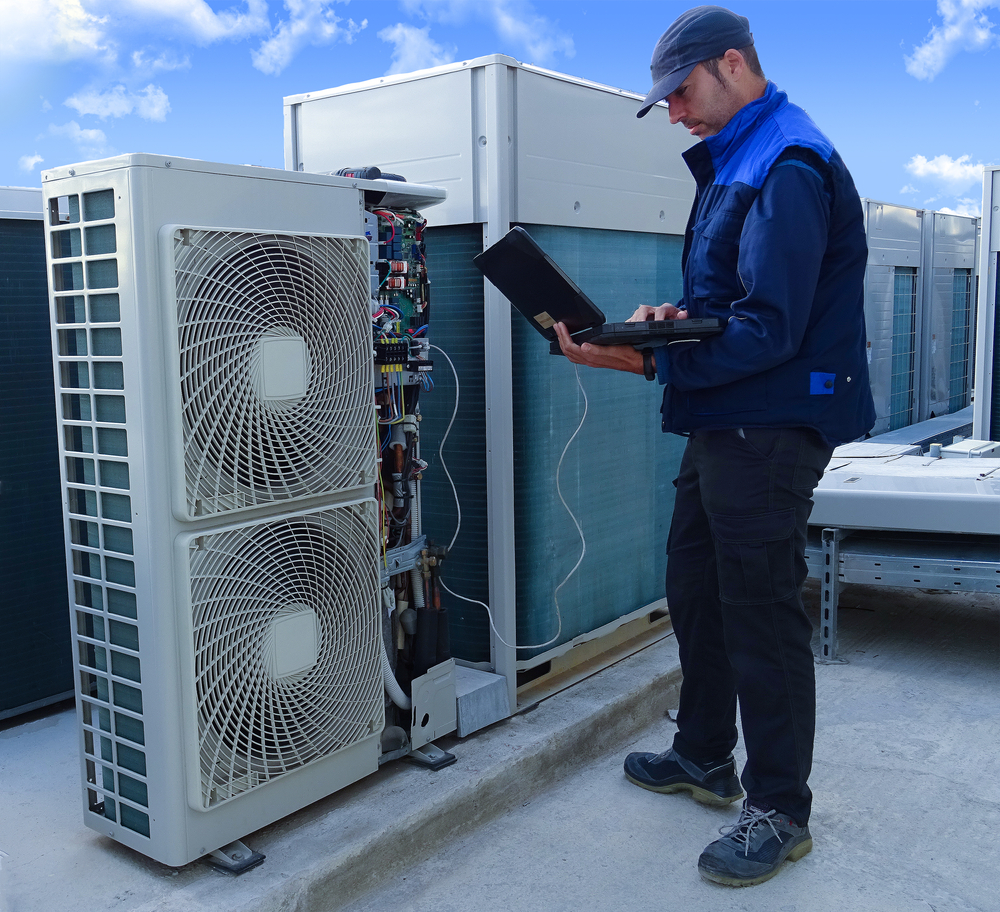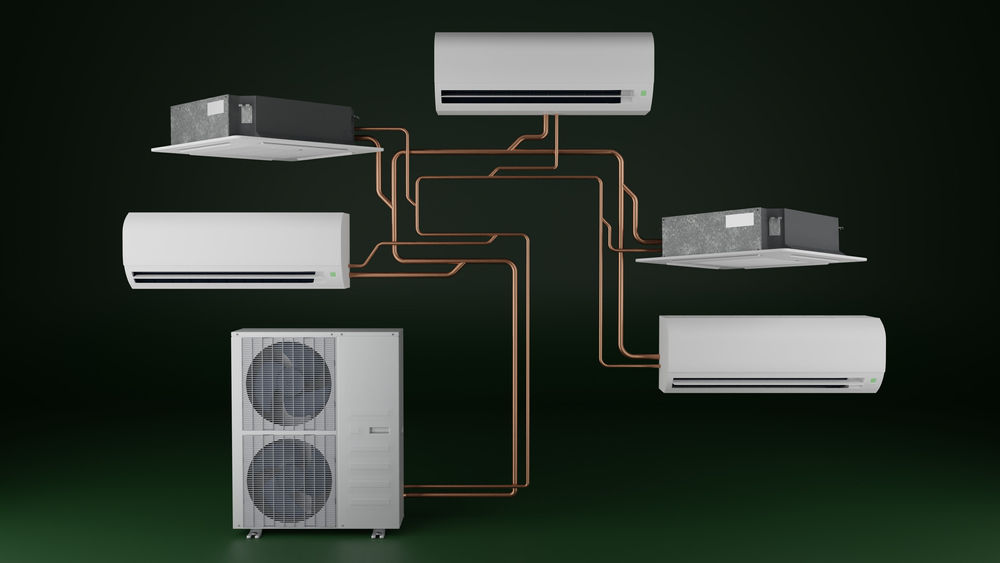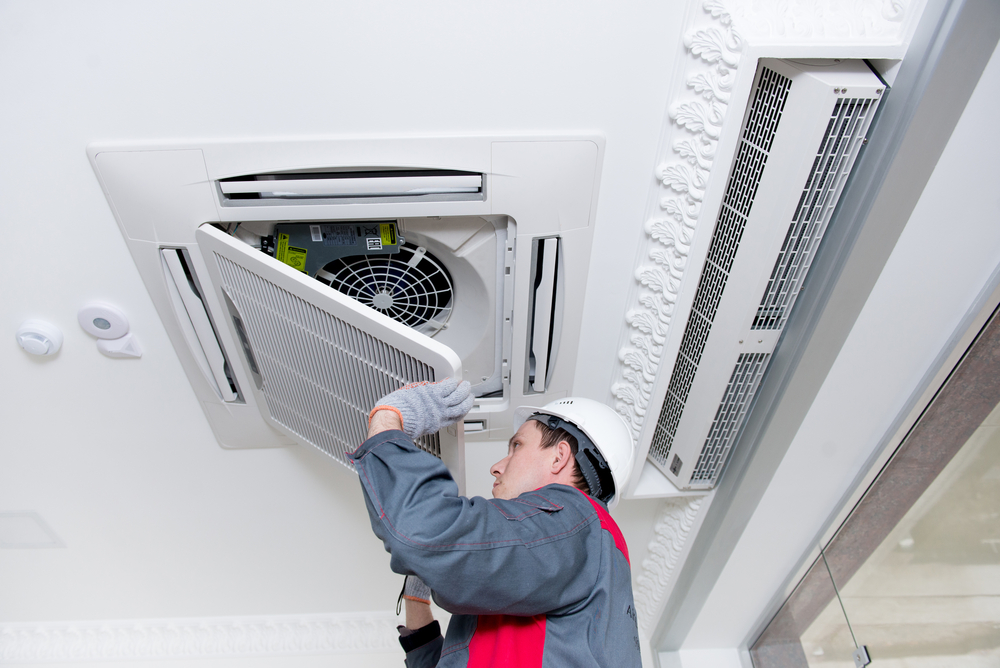
You’ve heard of ducted air conditioning and split systems, but how much do you know about VRV Air Conditioning?
VRV – or Variable Refrigerant Volume – is a state-of-the-art energy-efficient air conditioning system that varies the flow of refrigerant based on your requirements.
VRV systems are incredibly popular in large commercial buildings thanks to their low energy consumption, but they’re also becoming increasingly popular in family homes thanks to solutions like Daikin’s VRV-S residential systems.
In this article, we’ll cover everything you need to know about VRV systems, including what they are, how they work, as well as pros and cons to consider.
To explain VRV systems, let’s take a look at another common type of residential air conditioner – the split system.
Split systems are known for heating or cooling one room at a time. They’re made up of an indoor unit, which is typically mounted high on the wall, and a corresponding outdoor unit.
If you want to install split systems throughout the home, you can opt for multi-head split system air conditioning, where one outdoor unit allows you to individually power each indoor unit in your home.
VRV air conditioning is a multi-split air conditioning solution that’s taken to the next level!
Just like multi-split, you can power multiple indoor units from just one outdoor unit. However, the amount and variety of indoor units you can choose from is much larger with VRV systems.
Residential VRV units can have up to 14 indoor units for each outdoor unit, while commercial VRV systems can have 60+ indoor units.
If you don’t want traditional wall-mounted head units in your home, it’s no problem. With VRV systems, you can install different indoor units (also known as air handlers in different rooms, with options including:
Of course, the other defining quality of VRV air conditioning is how it works and its ability to precisely adapt its operation according to your needs.

VRV technology has been designed to abide by the following principles during operation:
1. The minimum required energy is used to maintain set indoor temperatures
2. When a room is unoccupied, the system switches off
3. Household operating costs and carbon emissions are minimised
4. Energy usage is recalculated and adjusted when additional indoor units are switched on, ensuring optimal power consumption and refrigerant use
VRV units achieve all this through the use of an outdoor unit (the inverter compressor), which is connected to multiple indoor units through a series of wired cables and refrigerant pipes. Each indoor unit is controlled either via a remote control or a wall-mounted control panel.
When you switch on an indoor unit, your VRV system kicks into gear. The system considers the current indoor and outdoor temperatures, plus the temperature you set on the remote. The system uses all this data to provide precise heating or cooling in the most efficient manner possible.
If you activate another indoor unit or there are other changes in conditions, the system will automatically adjust to meet your requirements effectively and efficiently.
When you’re looking for new air conditioning in Fawkner or split systems in Diamond Creek, VRV air conditioning may be an ideal solution for you!
The most common types of VRV systems are heat pump systems – where you can enjoy heating and cooling from all indoor units. However, if one unit is in heat mode, all units must be in heat mode (or vice versa).
If you want to heat and cool different areas simultaneously, you can look for heat recovery VRV systems. These systems are less common and typically reserved for commercial applications.
Another less common and less popular VRV AC is the cooling-only system, which does not have a heating mode at all.
Whether you choose Absolute Airflow for air conditioning in Canterbury or split systems in Ivanhoe, we can provide the Daikin VRV-S residential system, which provides reverse cycle (heat pump) heating and cooling.
Yes and no.
As we said, VRV stands for Variable Refrigerant Volume. Daikin is the originator of this technology and has trademarked the term VRV.
VRF stands for Variable Refrigerant Flow. The technology is essentially the same, but VRF is the general term used for all non-Daikin Variable Refrigerant Flow systems.
Of course, each manufacturer will have their own technology, algorithms, materials, and options, but aside from that, VRV and VRF essentially function the same.

VRV air conditioner installations can get quite complicated in large commercial buildings. However, in residential settings, VRV/VRF systems are much easier to install.
As with all permanent heating and cooling systems, professional installation is key to the overall performance of your air conditioner.
Here is just some of what’s involved in VRV installation:
The overall cost and complexity of the installation will depend on the characteristics of your property as well as your heating and cooling requirements. Air conditioner installation may be completed over one day or a series of days. For more information, chat with our heating and cooling specialists.
Now that you know more about VRV and VRF air conditioning, there’s only one thing left to ask…
Are you interested in the VRV-S residential air conditioning system from Daikin?
Whether you want a more advanced alternative to split systems in Ringwood, or you want intelligent and energy-efficient air conditioning in Kew, we have you covered. The Absolute Airflow team supplies, installs, and services Daikin VRV systems across Melbourne.
We can help you decide if a VRV system is right for you by providing expert advice and a free quote on the best air conditioning solutions in Victoria!
© Copyright 2024 - Absolute Air Flow - All Rights Reserved